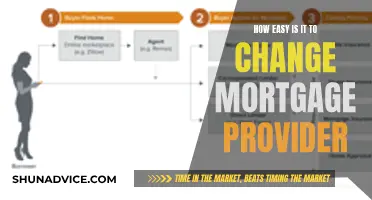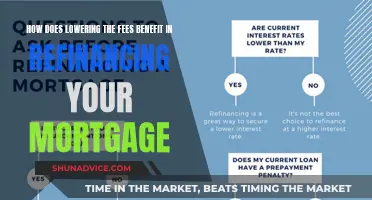
Borrowing more on your mortgage is possible, but it may not be the best financial option. Lenders will want to be certain that you can afford the extra amount and will closely examine your income, bank statements, and spending habits. The amount you can borrow depends on your individual circumstances, such as your current mortgage balance and the market value of your home. If your home has increased in value since you bought it, you could borrow a further advance from your mortgage lender. However, it is important to understand the true cost of borrowing and the consequences of not keeping up with repayments, as your home could be at risk.
| Characteristics | Values |
|---|---|
| Reasons to borrow more on your mortgage | Home repairs or upgrades, upfront expenses such as moving costs, new furniture, home renovations, debt repayment, funding a holiday or a new car, school fees, etc. |
| How much can you borrow? | Up to 95% of your property's value. |
| Eligibility criteria | Debt-to-income ratio (DTI), loan-to-value (LTV), credit rating, income, bank statements, spending habits, etc. |
| Other options | Credit cards, personal loans, debt consolidation loans, unsecured personal loans, etc. |
| Risks | You may pay more in interest over the life of the mortgage than with other financing options. Your home could be repossessed if you don't keep up with your repayments. |
What You'll Learn

Borrowing more on your mortgage to pay for home improvements
Borrowing more on your mortgage to fund home improvements is a common practice. This can be done by remortgaging your property to release equity, allowing you to borrow more against your property and free up cash. The amount you can borrow will depend on factors such as the equity you have in your home and the lender's criteria. While remortgaging can give you access to lower interest rates, it is important to consider the potential costs and risks involved.
When considering borrowing more on your mortgage, it is essential to evaluate the potential costs and how they compare to alternative financing options. Borrowing over a longer period with a mortgage can result in higher interest payments than shorter-term options like personal loans or credit cards. For example, borrowing £5,000 at 3% interest over 20 years on your mortgage will incur £1,630.88 in interest, whereas the same amount borrowed over three years through a personal loan at the same interest rate would cost only £231.41 in interest.
Additionally, it is crucial to assess the risks associated with increasing your mortgage debt. Lenders will evaluate your loan-to-value (LTV) ratio, which is the percentage of your property's value that you owe. A lower LTV indicates lower risk to the lender. They will also scrutinise your income, bank statements, and spending habits to ensure you can afford the additional borrowing. If your borrowing requirements are substantial (typically above £15,000), you may face greater scrutiny and be required to provide evidence of your financial stability.
Another factor to consider is the potential impact on your monthly mortgage payments. While remortgaging can lead to lower interest rates and more manageable repayments, it is important to remember that you will be paying interest on the additional funds over the entire mortgage term. This could result in higher monthly payments for an extended period. Furthermore, early repayment charges and fees associated with remortgaging should be factored into your calculations to determine the overall feasibility of this option.
Before deciding to borrow more on your mortgage, it is advisable to explore alternative financing options. Unsecured personal loans, for instance, do not require collateral and can offer competitive interest rates to borrowers with strong credit ratings. Secured loans, or home equity loans, are another option, but it is important to remember that failure to make repayments could result in the repossession of your home. Credit cards can also be a viable choice for smaller home improvement projects.
Mortgage Budgeting: Planning for the Impact of Home Loans
You may want to see also

Using a mortgage to pay off other debts
Borrowing extra on your mortgage to pay off other debts is possible, but it may not be your best option. There are several reasons why a borrower would take out a larger mortgage than they need to purchase a home. Many borrowers take out a larger mortgage to pay off high-interest debt from credit cards or other loans. In this case, you may reduce the amount you pay monthly on your debt balances, although your monthly mortgage payment will rise with a higher borrowing amount.
Before you ask for additional funds, it's worth considering whether there are other cheaper ways to borrow the money you need. Keep in mind that borrowing more on your mortgage can work out to be far more expensive than alternatives such as using a credit card or taking out a personal loan. This is because you're borrowing over a much longer period with a mortgage.
If you complete a cash-out refinance, when you make your mortgage payment, you will also be paying down your credit cards. Instead of balancing multiple cards with multiple due dates and aggressive interest rates, you have the ease of making one monthly payment at a lower and more affordable interest rate. The average American has four personal credit cards with varying interest rates. Mortgage interest rates are typically 3% to 5% compared to credit card interest rates, which can exceed 21%. As mortgage interest rates remain near record lows, as a homeowner, you may not only be able to consolidate your credit card and other major debts into one payment but also save thousands on interest.
There are a few things to consider when deciding to refinance your mortgage to pay off your debt. Firstly, evaluate your financial circumstances. Lenders typically require borrowers to have 20% equity in their home to qualify for a cash-out refinance. Equity is the difference between the current market value of your home and the outstanding balance on your mortgage. If the borrower has low equity, the financial benefit isn't significant enough for the borrower, and lenders won't approve the loan. Secondly, consider the interest rates. Because mortgages usually have lower interest rates than credit cards or other kinds of loans that you might need to pay off, you can reduce the interest of your overall debt. Finally, consider the risks. Taking out a second mortgage is a significant action, and the pros and cons should be carefully considered. Defaulting on your mortgage could result in the lender taking over your property.
Understanding PMI: Decoding Mortgage Statements
You may want to see also

How to release equity from your home
Borrowing more on your mortgage is possible, but it may not be the best financial option. It is important to consider the reasons for doing so and the potential impact on your financial situation.
One option for releasing equity from your home is to remortgage. This involves taking out a new loan with your current or a new lender to pay off your existing mortgage and then borrowing more money on top. This could give you access to a lower interest rate, but it is important to note that, as you are borrowing over a longer period, you may end up paying more in interest overall. Lenders will also consider the purpose of the loan, with home improvements being viewed as lower risk and, therefore, more favourable.
Another option is to take out a 'further advance', which means borrowing more money from your existing lender. This could increase the chances of your application being accepted as your lender will be familiar with your financial situation. However, it is worth noting that your monthly mortgage payments will increase with a higher borrowing amount.
There are also products specifically designed for equity release, such as lifetime mortgages and home reversion plans. Lifetime mortgages allow you to borrow against the value of your home and may not require monthly interest payments. However, the interest will be added to the total loan amount and will need to be repaid when you or the last borrower passes away or moves out. Home reversion involves selling a share of your property in return for a lump sum, and you will still be able to live in the home.
Before making any decisions, it is important to consider all your options and seek advice from a qualified financial adviser to ensure you understand the risks and long-term implications.
Exploring Mortgage Relief: Understanding 1031 Exchange Benefits
You may want to see also

The risks of borrowing more on your mortgage
Borrowing more on your mortgage can be a risky decision. Here are some of the potential risks involved:
Higher Interest Payments: Borrowing extra on your mortgage may result in paying more interest over the life of the loan compared to other financing options. Even if the interest rate on the additional borrowing is lower than other debt accounts, the longer duration of the mortgage means you could end up paying more interest overall.
Increased Monthly Mortgage Payments: While borrowing more may reduce your monthly debt payments, your monthly mortgage payment will increase with a higher borrowing amount. This could put a strain on your finances, especially if your income decreases or you face unexpected expenses.
Difficulty in Qualifying for a New Home Loan: Taking on a larger mortgage can impact your ability to qualify for a new home loan in the future. Lenders consider your debt-to-income ratio (DTI) and loan-to-value (LTV) ratio when assessing your eligibility for a new loan. A higher mortgage amount may negatively affect these ratios, making it challenging to obtain another loan.
Risk of Repossession: Failing to keep up with the increased mortgage repayments could result in your home being repossessed. This is a serious risk to consider before opting to borrow more against your property.
Scrutiny by Lenders: If you're seeking to borrow a substantial amount, such as more than £15,000, you may face greater scrutiny from lenders. They will assess your income, bank statements, spending habits, and affordability to determine if you can afford the additional borrowing.
Alternative Financing Options: Before borrowing more on your mortgage, consider whether there are cheaper and more flexible alternatives available, such as using a credit card or taking out a personal loan. These options may result in lower overall interest payments and won't put your home at risk.
Freedom From Mortgage: A Dream Come True
You may want to see also

How to get a better deal on your mortgage
Borrowing more on your mortgage is possible, but it may not be the best financial option. It may be a good idea to cover upfront expenses such as moving costs, new furniture, and home renovations. However, it is important to consider that you may pay more in interest over the life of the mortgage than with other financing options.
- Shop around for rates from multiple lenders: Research confirms that those who get multiple quotes get lower rates. Compare rates from different lenders to find the best deal. Don't settle for the first lender, and don't be afraid to negotiate. Understand the factors that influence your rate, such as your credit score, down payment, and loan type.
- Understand the true closing costs: Figuring out the true closing costs of a mortgage can be tricky. Escrow fees, property taxes, and homeowners insurance can impact the final cost. Get quotes from local lenders who may have a better idea of these variable costs.
- Consider negotiating mortgage rates: Understand which fees are negotiable and how to reduce your upfront costs. Ask for a Loan Estimate from multiple lenders to compare offers and potentially negotiate better terms. You can also consider negotiating mortgage rates in exchange for higher closing costs.
- Look for first-time homebuyer programs: Many governments offer down payment assistance programs and grants to help reduce closing costs for eligible borrowers.
- Improve your personal finances: Focus on raising your credit score, increasing your savings, and lowering your existing debts. This will strengthen your negotiating position and make you more attractive to lenders.
- Compare different loan types and fee structures: Gather a combination of different quote types, such as one with no closing costs, one with closing costs but no discount points, and one with a buydown.
- Understand the risks of borrowing more: Before asking for additional funds, consider if there are cheaper ways to borrow money. Borrowing more on your mortgage can be more expensive than alternatives like using a credit card or taking out a personal loan, as you're borrowing over a much longer period.
Remember that every loan and lender is different, so what can be negotiated may vary. Be proactive, ask questions, and negotiate whenever possible to get the best deal on your mortgage.
Mortgages: Impacting Your Balance Sheet and Financial Stability
You may want to see also
Frequently asked questions
It is possible to borrow more on your mortgage, but it may not be your best option. Lenders will want to be certain that you can afford your mortgage before agreeing to lend you more money, so they will closely examine your income, bank statements, and spending habits. They will also consider how risky your borrowing requirements are.
Lenders will take your loan-to-value (LTV) into account. Your LTV is what you owe on your home as a percentage of what it’s worth. The lower your LTV, the less risky you are to a lender. They will also consider your debt-to-income ratio (DTI), which compares how much you owe in monthly debt payments to how much you earn each month.
People borrow more on their mortgage for several reasons, including funding home improvements, paying off debts, helping a child to buy their first home, or paying for a holiday or a new car.
Yes, it is important to understand the true cost of borrowing and the consequences of not keeping up with your repayments. Your home could be repossessed if you don't keep up with your repayments. You may also pay more in interest over the life of the mortgage than you would with other financing options.







